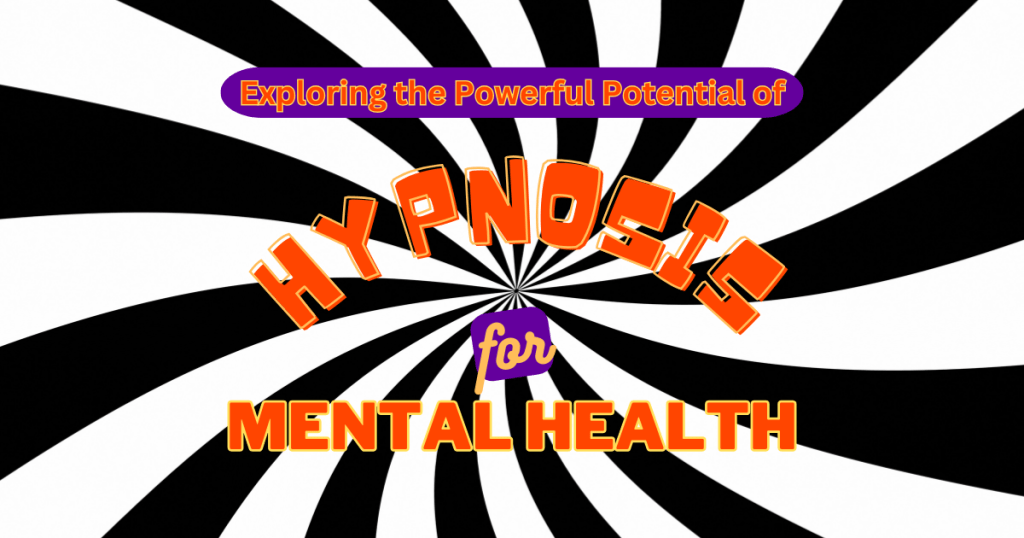DISCLOSURE: This post may contain affiliate links, which means we may receive a commission from Amazon or other affiliate partners if you make a purchase using these links. This is at no extra cost to you. For more information, please read our full Affiliate Disclosure.
Unlocking the hidden potential of the human mind has long been a goal and fascination in the field of mental health. One intriguing avenue that has gained attention in recent years is hypnosis. In this article, we delve into the powerful potential of hypnosis for mental health and its impact on the mind and well-being.
Hypnosis, often misunderstood and misrepresented in popular culture, is much more than a stage trick. This therapeutic technique has gained recognition and acceptance among researchers and healthcare professionals as an alternative approach to mental health treatment
By tapping into the power of suggestion and deep relaxation, hypnosis can help individuals overcome self-limiting beliefs, manage stress, improve self-esteem, and even alleviate chronic pain. As we explore the effects and benefits of hypnosis in mental health, we will reveal the science behind this practice and explain how it complements traditional therapies.
Additionally, we will discuss three main avenues to leverage hypnosis for mental health: self-hypnosis, guided hypnosis audio, and face-to-face hypnotherapy.
Lastly, we will look at 3 things hypnosis cannot do. By understanding the limitations of hypnosis, we can approach this practice with a realistic mindset and make informed decisions about its potential benefits for us.
Join us on this journey as we uncover the potential of hypnosis and its ability to unlock a brighter future for mental health and overall well-being.
How Does Hypnosis Work?
Hypnosis allows an individual to access their unconscious mind, facilitating positive change in areas such as stress, anxiety, depression, addiction, and more. By inducing a state of deep relaxation and heightened focus, hypnosis bypasses the critical conscious mind and taps into the powerful unconscious.
During a hypnosis session, the individual is guided into a trance-like state, where their mind becomes more receptive to suggestions and imagery. Contrary to common belief, hypnosis does not involve mind control or manipulation. Instead, it empowers individuals to tap into their inner resources and make positive changes from within.
Research has shown that during hypnosis, the brain undergoes physiological changes, including increased activity in areas associated with focus, attention, and suggestibility. This altered state of consciousness allows individuals to explore and address deep-rooted beliefs, emotions, and memories that may be contributing to their mental health challenges.
A Brief History of Hypnosis in Mental Health

Once primarily seen as entertainment, hypnosis has evolved into a recognized therapeutic technique. Its transformation from a stage act to a respected therapeutic tool reflects a shift towards understanding and harnessing its potential for positive psychological impact.
However, the use of hypnosis for therapeutic purposes dates back thousands of years. Ancient civilizations, such as the Egyptians and Greeks, recognized the power of trance-like states in healing the mind and body. However, it wasn’t until the late 18th century that hypnosis gained significant attention in the field of mental health.
This is when Franz Mesmer, a German physician pioneered the concept of inducing a trance-like state for therapeutic purposes. The late 19th and early 20th centuries saw increased interest, with psychologists like Sigmund Freud and Carl Jung incorporating hypnosis into their work. They utilized hypnosis to explore the unconscious mind and uncover repressed memories and emotions.
By the mid-20th century, hypnosis gained recognition as a legitimate therapeutic tool. Milton Erickson’s innovative approaches contributed to its evolution, emphasizing individualized techniques.
Today, hypnosis is widely accepted as a complementary therapy in the field of mental health. It is employed for various conditions, including anxiety, trauma, and pain management, as part of integrative and complementary therapeutic approaches.
Scientists are still studying how well hypnosis works. The findings make it clear that hypnosis can be a helpful addition to mental health treatments.
Benefits of Using Hypnosis for Mental Health
Hypnosis offers a range of benefits for mental health, making it a valuable tool in the treatment of various conditions. It also positively influences the mind-body-spirit connection. By promoting relaxation and reshaping thought patterns, it fosters a holistic sense of well-being, aligning mental, physical, and spiritual aspects for overall harmony. Here are some of the ways hypnosis helps mental health and well-being.
Addiction Recovery
Addiction is a complex and challenging condition that requires a comprehensive approach to treatment. Hypnosis can be a valuable tool in the recovery process. It helps to address the underlying emotional and psychological factors that contribute to addictive behaviors. Hypnosis can help individuals identify triggers, develop coping mechanisms, and strengthen their motivation to overcome addictive behaviors. It can also assist in building new, healthy habits and reinforcing positive beliefs and behaviors associated with sobriety.
Anger Management
Hypnosis aids in anger management by inducing a heightened state of relaxation. It enables individuals to gain better control over anger triggers and foster a more composed response. The restructuring of underlying thought patterns and emotional responses promotes a calmer and more measured approach to managing anger.
Anxiety Management
One benefit of using hypnosis for anxiety is its potential to promote deep relaxation, helping individuals manage and alleviate anxious feelings through a focused and calming state of mind.
Alleviate Chronic Pain
By altering perception and increasing pain tolerance, hypnosis can provide relief for individuals suffering from conditions such as fibromyalgia, migraines, and arthritis. It offers a non-invasive and drug-free approach to pain management, making it a valuable option for those seeking alternative treatments.
Boost Low Self-Esteem
Hypnosis provides a powerful tool for addressing and improving self-esteem issues by accessing the unconscious mind and reprogramming limiting beliefs. It typically involves guiding the individual into a relaxed state and introducing positive affirmations and visualizations. Through repetition and reinforcement, these suggestions can help individuals develop a more positive self-image, increase self-acceptance, and cultivate a sense of self-worth.
Build Confidence
Hypnosis can enhance confidence by accessing and reinforcing positive beliefs and self-perceptions, fostering a more empowered mindset. Through suggestion and imagery, it helps reshape the unconscious narrative, instilling a deep sense of self-assurance and belief in one’s capabilities.
Enhance Concentration and Focus
Hypnosis facilitates improved concentration and focus by guiding individuals into a state of heightened mental awareness. This enables them to overcome distractions and enhance cognitive performance through targeted suggestions and visualization.
Improve Sleep
Hypnosis aids sleep by inducing a relaxed state and addressing stressors or anxieties that contribute to insomnia. The calming suggestions and imagery foster a conducive environment for improved sleep quality.
Overcome Limiting Beliefs
By accessing the unconscious mind, hypnosis allows individuals to reframe negative thought patterns, enhance self-confidence, and develop a more positive mindset.
- Transform Negative Self-Talk
- Feel Calmer and Better About Yourself
- A Deeply Relaxing Experience
- The First Steps Towards Real Change
Phobia Management
Phobias and fears can be debilitating and significantly limit an individual’s daily life and experiences. Hypnosis has proven to be an effective approach for addressing and overcoming phobias by accessing the unconscious mind and retraining the brain’s response to specific triggers. Through therapeutic suggestion and gradual desensitization, hypnosis helps individuals develop healthier responses to phobic triggers.
Stress Management
Stress is a prevalent mental health concern that can significantly impact one’s quality of life. Hypnosis can aid in stress management by inducing a state of deep relaxation and reducing tension. Additionally, hypnosis can help individuals reframe negative thought patterns and adopt a more positive and empowering mindset.
Trauma Resolution
Hypnosis can help trauma resolution by creating a calm state that allows individuals to access and process traumatic memories more effectively. Guided by a trained therapist, this therapeutic approach helps individuals reframe and integrate traumatic experiences, fostering healing and resilience.
How Is Hypnosis Done?
Individuals can leverage hypnosis for mental health through three main avenues: self-hypnosis, guided hypnosis audio, and face-to-face hypnotherapy. Let’s explore each one in more detail, starting with how to do self-hypnosis.
1. Self-Hypnosis
What is self-hypnosis?
Self-hypnosis is a process of performing hypnosis on yourself. You can learn to induce a state of deep relaxation and focused attention so that you can access your unconscious mind. By accessing the unconscious mind, you can then reprogram negative thoughts and replace them with positive affirmations, allowing you to create lasting change. Unlike traditional hypnosis, self-hypnosis allows you to guide yourself into a trance-like state, giving you full control over the process.
How does self-hypnosis work?
A step-by-step guide below outlines a clear process for self-hypnosis practice. Read through the steps to familiarize yourself with them. These steps can be changed to suit your personal preferences but this is a good way to start.
Preparing for Self-Hypnosis: Set A Clear Intention or Goal
Before you begin your self-hypnosis practice, it’s essential to decide on clear intentions and goals:
- Ask yourself what specific areas of your life you want to improve or change. Do you want to boost your confidence, manage stress, or overcome a specific fear?
- Create positive affirmations to support your intention. Write short positive statements in the present tense. Make them specific and focused.

Step 1: Choose a Quiet and Comfortable Space
Find a quiet and comfortable space where you won’t be disturbed. It’s important to set the stage for relaxation by dimming the lights, playing soft music, or incorporating aromatherapy.
Step 2: Set an Intention
Take a moment to focus on the purpose or goal of your self-hypnosis session that you previously decided on. You can use the following sentence starter to set your intention: “Today I am committed to………………..”. For example: “Today I am committed to reducing my stress”.
Step 3: Get Comfortable
Sit or lie down in a relaxed position. Ensure you’re comfortable.
Step 4: Deep Breathing
Close your eyes, (if you find this relaxing) and take slow, deep breaths to promote relaxation.
Step 5: Progressive Muscle Relaxation
Starting from your toes, tense and then relax each muscle group as you work your way up your body.
Step 6: Focus Your Attention
Concentrate on a specific point or imagine a calming scene.
Step 7: Use Positive Suggestions
Repeat positive affirmations or suggestions related to your goal. You can repeat this silently or aloud during your self-hypnosis session.
Step 8: Visualize
Picture yourself achieving your desired outcome or experiencing a positive scenario. Imagine the positive changes in your thoughts, emotions, and behavior.
Step 9: Stay Relaxed
Maintain a calm and open mindset, allowing the suggestions to take effect. Keep breathing slowly and deeply.
Step 10: Gradual Awakening
Slowly bring yourself back to full awareness, counting back from 5 (while breathing slowly and deeply) or using other techniques.
Step 11: Reflect
Take a moment to reflect on the experience and any insights gained. You may like to record your thoughts and feelings in a journal.
Hopefully, these steps will give you a good understanding of how self-hypnosis works. Remember, practice and consistency enhance the effectiveness of self-hypnosis. Adjust the steps to suit your preferences and goals. It’s important to note that self-hypnosis is a skill that takes practice and patience.
2. Guided Hypnosis Audio
Hypnosis audio provides accessible guided sessions, catering to diverse needs. Guided hypnosis audio involves recorded sessions where a narrator provides instructions and suggestions to induce a hypnotic state. These recordings typically guide individuals through relaxation techniques, positive affirmations, and visualization exercises.
Many guided hypnosis sessions can be found online. These include YouTube videos and free or paid hypnosis audio recordings that you can download for specific challenges.
Uncommon Knowledge is one company that provides more than 1250 hypnosis downloads for challenges that include: stress, anxiety, fears, phobias, addictions, motivation, confidence, and much more. You can read our review about Uncommon Knowledge hypnosis to find out more about them and the service they provide.
As with all hypnosis sessions, to benefit from these recordings, individuals should find a quiet space where they can relax without distractions. Use comfortable headphones, and listen to the guided hypnosis audio regularly.
Consistent and focused listening can contribute to the effectiveness of the sessions over time, supporting mental well-being and personal development.

3. Hypnosis with a Trained Hypnotherapist
Face-to-face hypnotherapy with a trained therapist provides a unique and personalized approach to mental well-being through hypnosis. Unlike self-hypnosis or guided hypnosis audio, this method offers several distinct benefits:
Tailored Guidance
A trained therapist can tailor the hypnotherapy sessions specifically to an individual’s needs, addressing unique concerns and goals with a personalized approach.
Immediate Feedback

In face-to-face sessions, therapists can provide immediate feedback, ensuring that the individual is responding well to the hypnotic suggestions and making any necessary adjustments in real time.
Interactive Nature
The interactive nature of face-to-face sessions allows for a dynamic exchange between the individual and the therapist, fostering a deeper understanding of the individual’s responses and facilitating a more effective therapeutic process.
Adaptability
Therapists can adapt their techniques based on the individual’s progress and evolving needs, creating a more flexible and responsive therapeutic environment.
Building Trust and Rapport
Establishing a personal connection and building trust is often easier in face-to-face sessions, contributing to a more supportive and comfortable relationship.
Customized Strategies
Therapists can integrate various techniques beyond hypnosis, creating a holistic and customized strategy that aligns with the individual’s overall well-being goals.
Overall, face-to-face hypnotherapy provides a comprehensive and individualized approach to mental well-being, leveraging the expertise of a trained professional to optimize the benefits of hypnosis for mental health and well-being.
Misconceptions About Hypnosis
Despite the growing acceptance of hypnosis for mental health, there are still common misconceptions that surround this practice. It is crucial to address these misconceptions about hypnosis to ensure individuals have realistic expectations regarding both the benefits and limitations of this therapeutic technique.
3 Things Hypnosis Cannot Do
1: Hypnosis cannot make you do something against your will
Contrary to popular belief, hypnosis cannot make you do anything that goes against your core values and beliefs. While it can influence your thoughts and behaviors, it cannot override your free will. You are in control of your actions, even in a hypnotic state.
The purpose of hypnosis is to tap into your unconscious mind and align it with your conscious goals and desires. It’s a collaborative process between the hypnotist and the individual being hypnotized. Any suggestions made are ultimately evaluated and accepted or rejected by the individual based on their own beliefs and values.
2: Hypnosis cannot erase memories or change your personality
Hypnosis is often associated with the idea of “repressed memories” and the ability to erase traumatic or unwanted experiences. However, this is not entirely accurate. While hypnosis can help you access and process memories, it cannot make them disappear. Memories are deeply rooted in the neural pathways of our brains and cannot be easily erased or altered. Hypnosis can be a useful tool for gaining insight into past events. However, it cannot change the reality of what has happened.
Similarly, hypnosis cannot fundamentally change your personality. Your personality traits and core beliefs are shaped by a multitude of factors. These include genetics, upbringing, and life experiences. While hypnosis can help you explore and potentially modify certain aspects of your personality, it cannot completely alter who you are at your core. Personal growth and self-improvement require active engagement and effort beyond the scope of hypnosis alone.
3: Hypnosis cannot guarantee immediate and permanent results
Hypnosis is often sought after as a quick fix for various issues, ranging from stopping smoking to weight loss. While hypnosis can be a powerful tool for personal transformation, it’s important to understand that it is not a magic cure-all. The effectiveness of hypnosis varies from individual to individual, and results may not be immediate or permanent.
Achieving lasting change often requires ongoing commitment, practice, and reinforcement of the suggestions received during hypnosis. It’s essential to approach this with realistic expectations. Be prepared to put in the necessary effort to achieve your desired outcomes.
Questions About Hypnosis
Here are some frequently asked questions about hypnosis that you may be wondering about too.
Can anyone be hypnotized?
Most individuals can experience hypnosis; however, the depth and effectiveness can vary.
Is hypnosis the same as being asleep?
No, hypnosis induces a focused state of attention and heightened suggestibility, distinct from sleep.
How long does hypnosis take to work?
The time for hypnosis to work varies; some may notice changes after a few sessions, while others may require more time for consistent practice or therapy.
How long do the effects of hypnosis last?
The duration varies, but the positive effects of hypnosis can be long-lasting, especially with regular practice.
Can I get stuck in a hypnotic trance?
No, individuals naturally emerge from hypnosis, and it is not possible to remain stuck in a trance state.
How much does hypnosis cost?
The cost of hypnosis sessions in the United States can vary widely based on factors such as the practitioner’s experience, location, and the specific purpose of the sessions. On average, individual sessions may range from $75 to $300 or more. Some practitioners offer package deals or reduced rates for multiple sessions.
Additionally, group sessions or self-hypnosis resources, such as hypnosis audio recordings, may be more cost-effective options. It’s advisable to research and contact individual practitioners to get specific pricing information in your area.
Conclusion: Embracing Hypnosis for Mental Health and Well-Being
As we have shown in this article, hypnosis offers a powerful potential for improving mental health and well-being. By tapping into the unconscious mind, hypnosis can facilitate positive change. It can address deep-rooted beliefs and emotions, and enhance overall mental and emotional well-being.
While hypnosis should not be seen as a standalone solution for serious health conditions, using hypnosis for mental health problems can offer a complementary therapeutic approach. When integrated into a comprehensive treatment plan, hypnosis can empower individuals to unlock their hidden potential and create lasting positive change in their lives.
Finally, hypnosis holds tremendous promise in the field of mental health. It offers an alternative approach that is both intriguing and effective. By embracing the potential of this powerful tool, we can unlock a better future for mental health and pave the way for greater well-being and fulfillment.
Share Your Thoughts And Experiences
Your insights and experiences are invaluable—share them with us by leaving a comment below! We’d love to hear from you.


